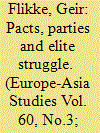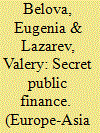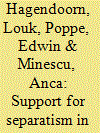|
|
|
Sort Order |
|
|
|
Items / Page
|
|
|
|
|
|
|
| Srl | Item |
| 1 |
ID:
082094


|
|
|
|
|
| Publication |
2008.
|
| Summary/Abstract |
This article explores the discourse of the Russian elite on foreign policy in general and on the European Union in particular, and identifies the main reasons for Russia's resistance to Europeanisation. At a theoretical level, the article builds upon the study of discourse conceived in 'structural' terms, and argues that discursive incompatibility at a deeper discursive level prevents the socialisation of elite members to attitudes more sympathetic to Europe at a more superficial level. Methodologically, the research is based on content analysis of major Russian foreign policy documents, presidential speeches and, in particular, of a set of interviews with Russian foreign policy-makers and academics most frequently in touch with the European Union
|
|
|
|
|
|
|
|
|
|
|
|
|
|
|
|
| 2 |
ID:
082093


|
|
|
|
|
| Publication |
2008.
|
| Summary/Abstract |
This article resuscitates some of the theoretical arguments of transition studies to shed light on the complex institutional and political developments in post-Orange Ukraine (2004 - 2007). In December 2004, Ukraine's elite agreed to embark on a complex transition involving power-sharing between the Rada (parliament) and the government on one side, and the presidency on the other. The new electoral law was to be based on a fully proportional system. In the subsequent period of 2005 - 2007, two consecutive proportional elections have been held, Ukraine has had several governments, and the Rada was incapacitated for a longer period. Rival elites engaged in a zero-sum game over reforms, and attempts were made to resolve differences by several pacts. This article analyses the post-Orange transition in terms of three variables: the effectiveness of pacts, the need to abide by the transition scheme, and the effect of elections. It is argued that Ukraine has failed to deliver on pacts and timetables, but has delivered on elections. This means that its political system may be considered a minimalist and electoral based one
|
|
|
|
|
|
|
|
|
|
|
|
|
|
|
|
| 3 |
ID:
082096


|
|
|
|
|
| Publication |
2008.
|
| Summary/Abstract |
Patterns of the Soviet Communist Party expenditures, major sources of revenue, and patterns of interregional transfers are analysed with special attention to the party's major donors: the army and large cities. Financial records for the period 1938 - 1965 allow us to study the role of the party in the Soviet institutional design and the relationships between central and regional party organisations. In addition to the selection of cadre, supervision of production, and 'production' of ideology, the party provided alternative channels for the redistribution of state resources. Empirical evidence suggests that the pattern of the distribution of subsidies through party channels was consistent with investing in political support by creating promotion incentives in the party system.
* We are grateful to Bruce Buena de Mesquita, Gerald Dorfman, Michael Ellman, Paul Gregory, Kerry Pannell, Alvin Rabushka, and Dariusz Stola for their interest in this project and many valuable suggestions, two anonymous referees for their helpful comments, and Ann Wood for her keen eye. This article also benefited from the input of participants in Stanford Social Science History workshop, the UCLA Von Gremp workshop, and the Hoover Soviet Economic History workshop. Financial support from the Hoover Institution and the assistance of the Hoover Institution Archives staff are gratefully acknowledged. The authors take full responsibility for any errors in this text.
|
|
|
|
|
|
|
|
|
|
|
|
|
|
|
|
| 4 |
ID:
082095


|
|
|
|
|
| Publication |
2008.
|
| Summary/Abstract |
The EU's political conditions have been a consistent and at times salient element in the accession process, since Brussels enlarged their scope and tightened procedures from the mid-1990s. But so far little attention has been given to post-accession compliance with these conditions. This is important, for while the European Commission no longer monitors them, the political conditions were imperfectly implemented by the time of the 2004 enlargement. The question that therefore arises is whether compliance continues or whether there are any tendencies to reverse the process. Using a comparative approach based on four alternative hypotheses, this problem is explored in detail using the case of Slovakia, a country where the EU has been a prominent factor in its return to the path of democratisation after the Meiar years. Comparing Slovakia's performance on the EU political conditions before EU entry in 2004 and during the three years after, two competing approaches, 'rationalist' and 'constructivist', are assessed. It is found that the fears of the rationalists have not been strongly justified nor have the hopes of the constructivists been much encouraged. The outcome of political conditionality is related to democratic consolidation in Slovakia, and the conclusion is that the former assisted the latter despite its limitations but much more with respect to reforming institutions than to changing either attitudes or behaviour.
* This article draws on the author's work for an ESRC Fellowship for 2004 - 2007 on 'Europeanising Democratisation?: EU Accession and Post-Communist Politics in Slovakia, Latvia and Romania'. During this fellowship, three fieldwork visits to Slovakia were made in March 2004, May 2005 and September 2006, when altogether 85 elite interviews were conducted. It also, where necessary, draws on previous fieldwork there from 1995 including 107 elite interviews in Bratislava.
|
|
|
|
|
|
|
|
|
|
|
|
|
|
|
|
| 5 |
ID:
082092


|
|
|
|
|
| Publication |
2008.
|
| Summary/Abstract |
This study examines popular support for separatism among Russians and non-Russian titular nationalities (titulars) in 10 ethnic republics of the Russian Federation: Karelia, Komi, Tatarstan, Bashkortostan, Udmurtia, Adygea, Dagestan, Kabardino-Balkaria, Sakha-Yakutia and Tuva. A survey was carried out in the urban regions of these republics in 1999 and 2000 in which 5,233 Russians and 4,703 titulars participated. We found that perceived negative inter-group relations significantly contribute to support for separatism among titulars, but reduce support for separatism by Russians. In contrast, indicators of prosperity of the republic and prior separatist elite-activism predict support for separatism among both titulars and Russians.
* An earlier version of this paper was presented at the 2006 Scientific Meeting of the International Society for Political Psychology, Barcelona, 15 July 2006. The research was funded by the Dutch Organization of Scientific Research under the label 'Russians as minorities, post-communist ethnic relations in five semi-autonomous regions of the Russian Federation I and II' in 1997 and 1998. The Centre for Sociological Studies (OPINIO) of Moscow State University gathered the data. The authors would like to acknowledge the International Association for the Promotion of Co-operation with Scientists from the New Independent States of the Former Soviet Union (INTAS) for grant 03-51-4997
|
|
|
|
|
|
|
|
|
|
|
|
|
|
|
|
|
|
|
|
|